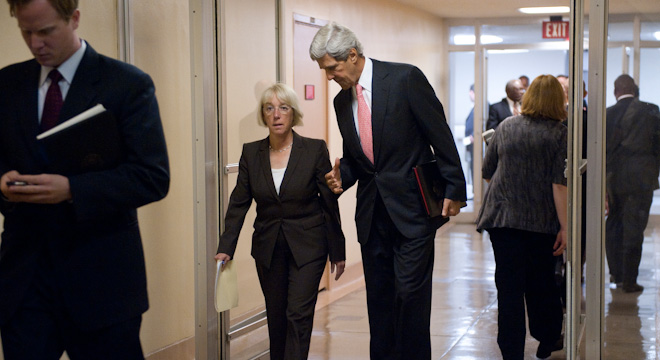Democrats on the new deficit Super Committee are determined to be better negotiators than their predecessors in earlier deficit discussions leading up to the debt limit fight.
According to aides with knowledge of the discussions, they’re trying to keep the panel’s early focus on revenues, to avoid falling into a familiar trap of agreeing to a bunch of spending cuts only to have Republicans freeze up when they try to change the conversation to taxes.
A bit of background is appropriate here.
Republicans were never going to make it easy. But one of the reasons the debt limit deal included zero dollars in new tax revenue, explicit or implicit, traces back to the unfinished work of a bipartisan group of congressional negotiators, led by Vice President Joe Biden. Those discussions proceeded from the idea that Democrats and Republicans should begin talks on areas of agreement, then work their way outward to more contentious issues like safety net programs and taxes. But a funny thing happened once the group had exhausted the easy stuff, and even some of the issues near and dear to liberals. Democrats said, ‘let’s talk taxes,’ and the Republicans in the room — House Majority Leader Eric Cantor (R-VA), and Senate Minority Whip Jon Kyl (R-AZ) — bolted. That kicked the negotiations upstairs to President Obama and Speaker John Boehner, who were famously unable to reach a “grand bargain” that would have included new tax revenues.
Thus House and Senate leaders were left with the Biden group’s framework — all cuts, no revenue — as the basis for the debt limit deal.
Aides to Democratic committee members — who can’t be named because of the sensitivity of the discussions, and couldn’t comment on specific policy options — have confirmed that the six negotiators are very wary of falling into the Biden group trap. The aides say the panel’s Democrats are focused on making sure Republicans are truly willing to compromise when it comes to revenue and the tax code before any agreements are made on additional spending cuts.
President Obama’s threat to veto Super Committee legislation that doesn’t pair Medicare cuts with new tax revenues only strengthens the Democrats’ hand with this strategy.
This should hearten progressives concerned that Democrats — or one lone rebel Democrat willing to vote with all six committee Republicans — will sell the GOP the farm for zero, or trivial new revenues. But it will probably make the deafening “go big” crowd fret that the panel won’t do anything significant about future deficits and the debt. After all, it’s taken for granted by much of establishment Washington that Republican unwillingness to accept significant new tax revenues is an immutable fact of politics.
For now, members of the Super Committee have been exceptionally tight-lipped about their meetings, suggesting they’re making some headway. If and when that changes, it’ll be a sign that this strategy is encountering headwinds.










